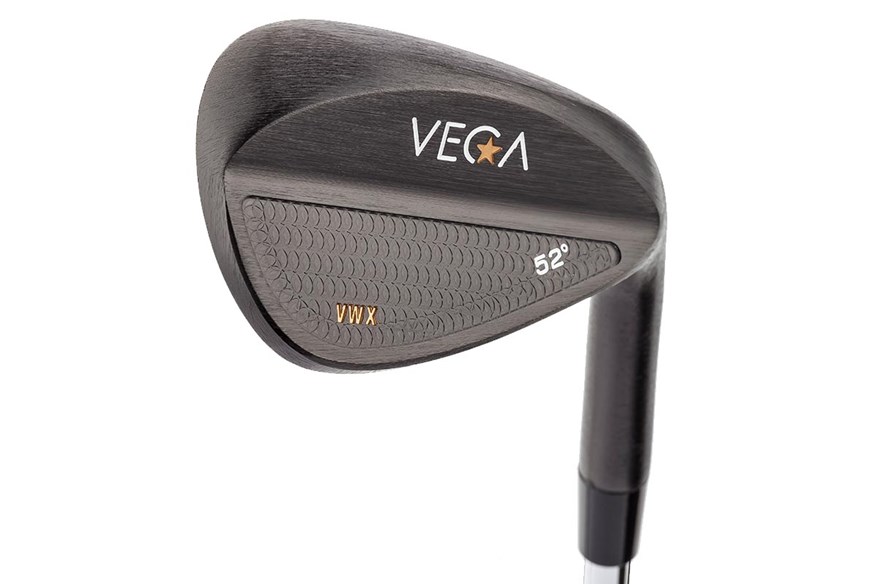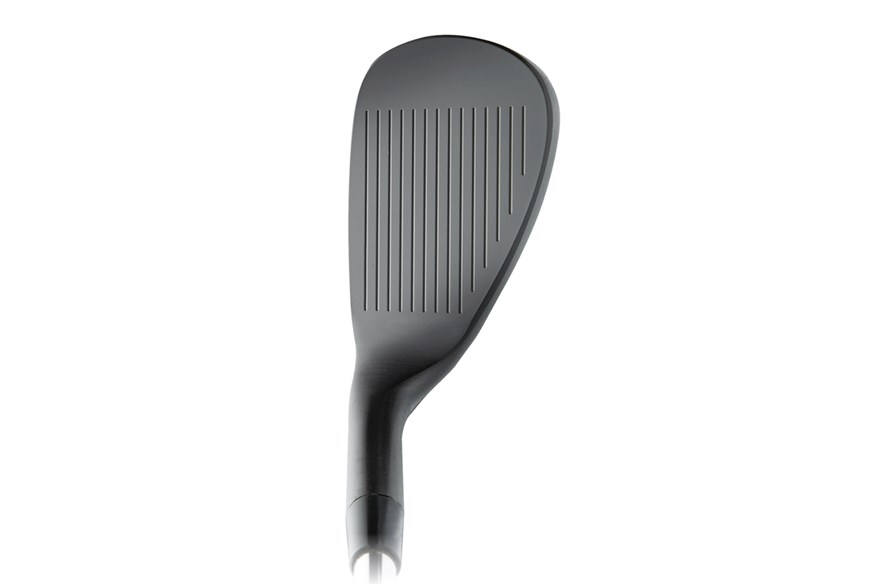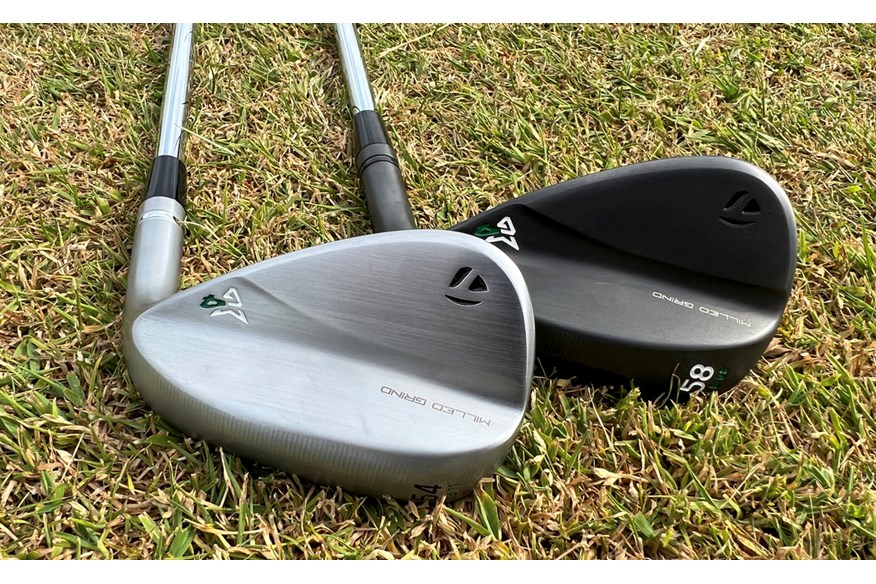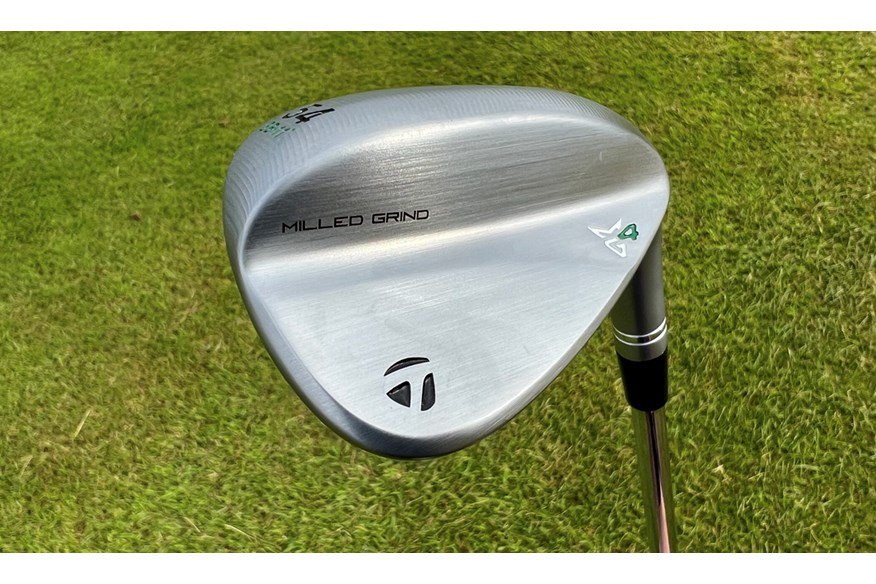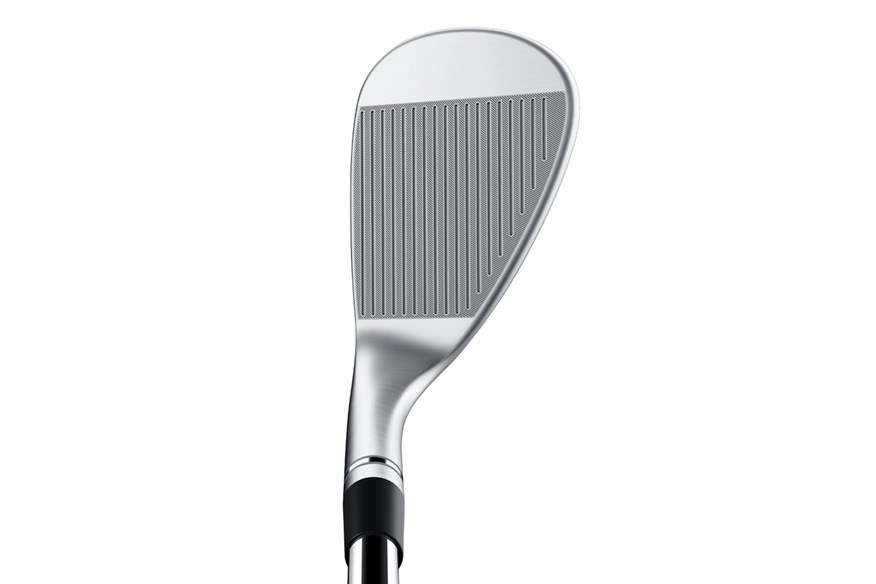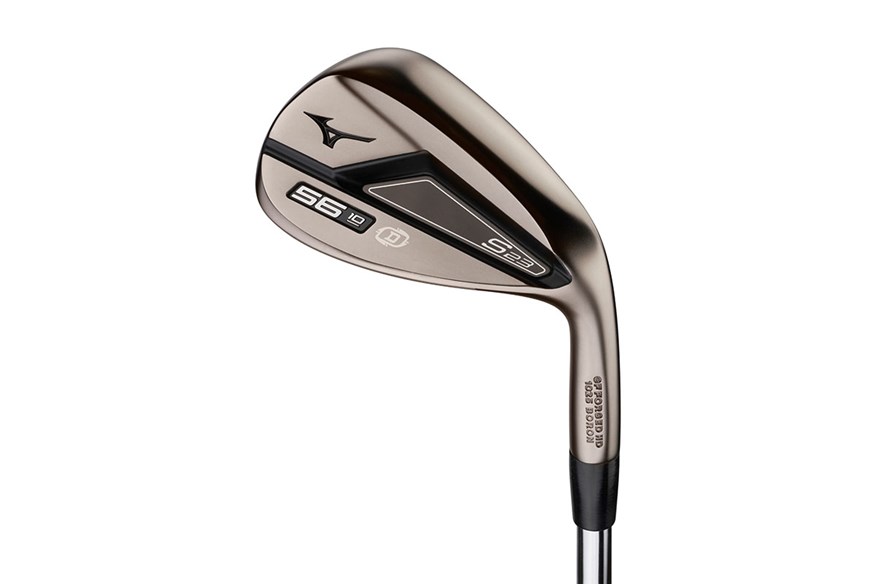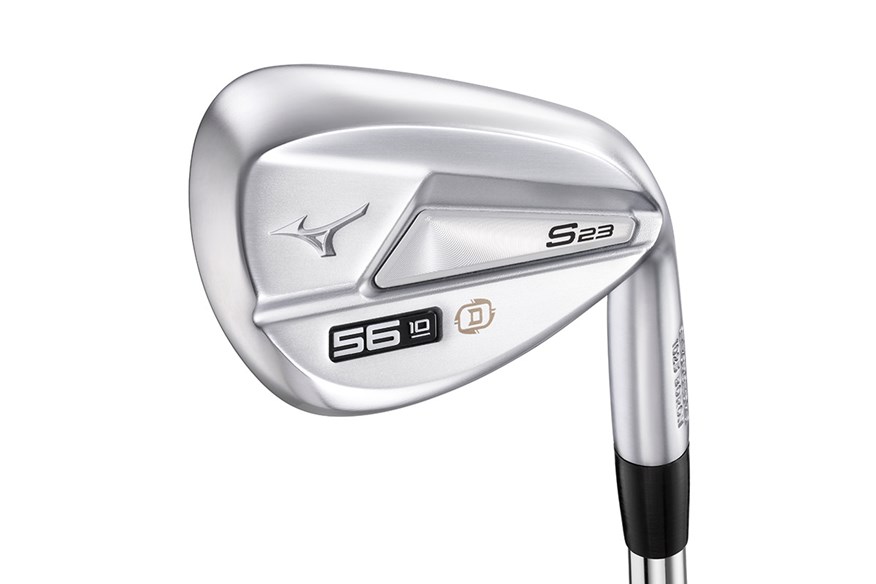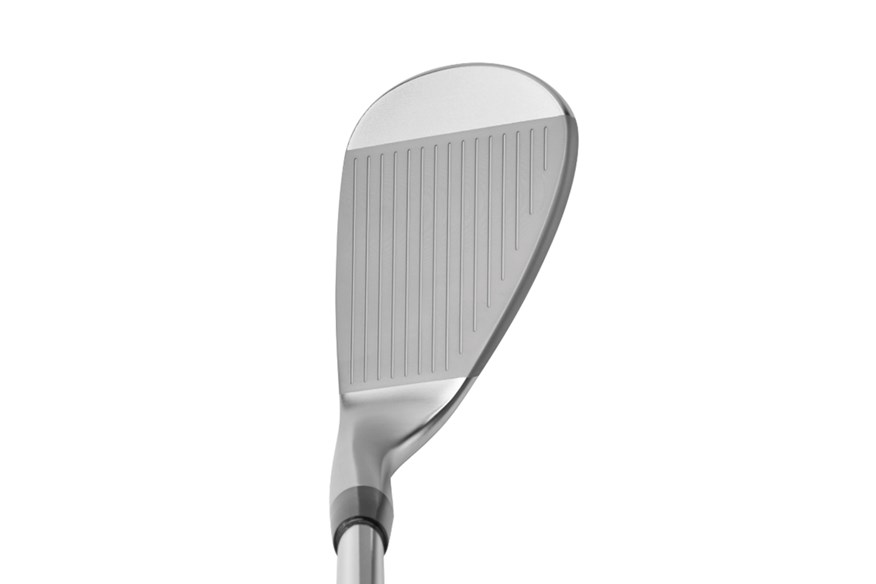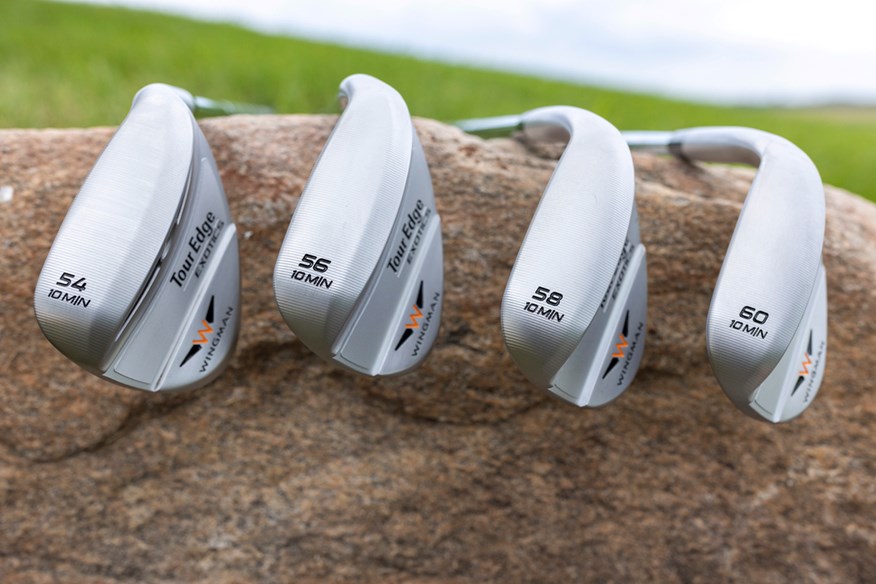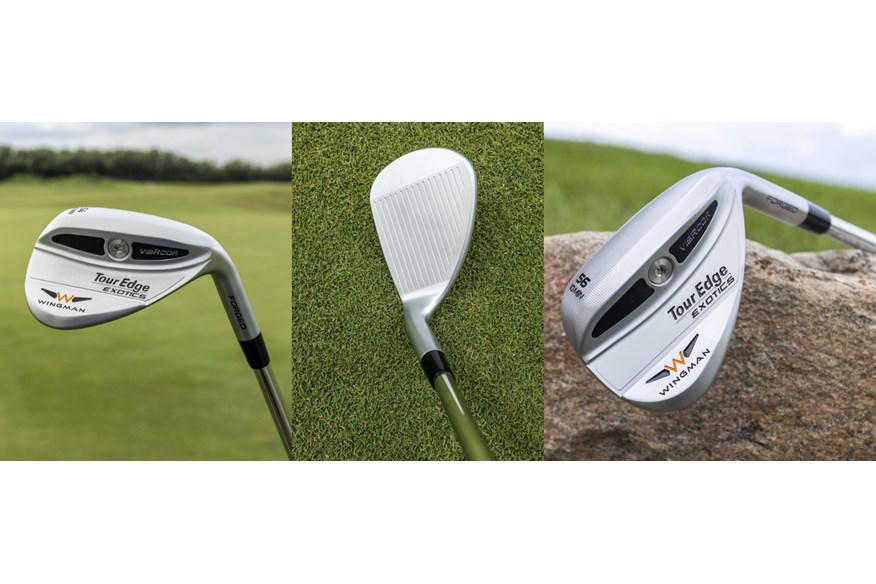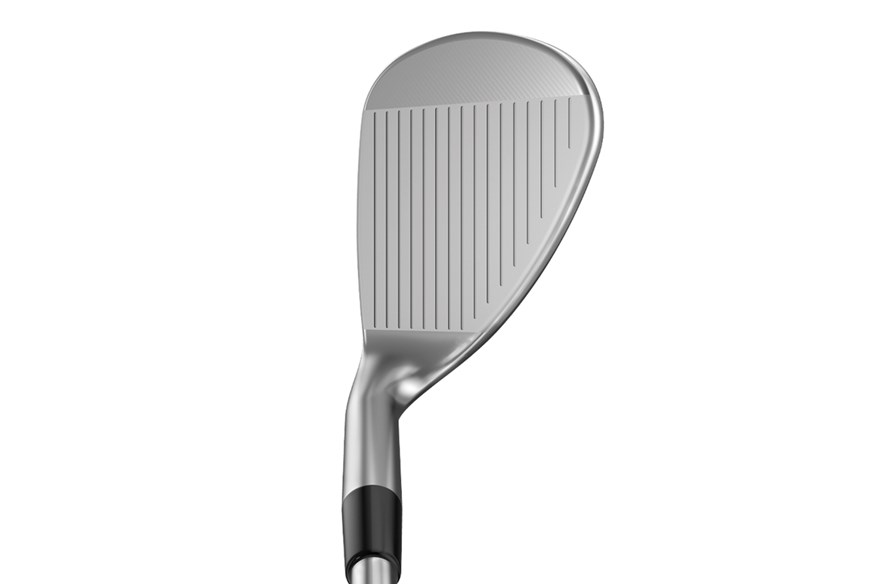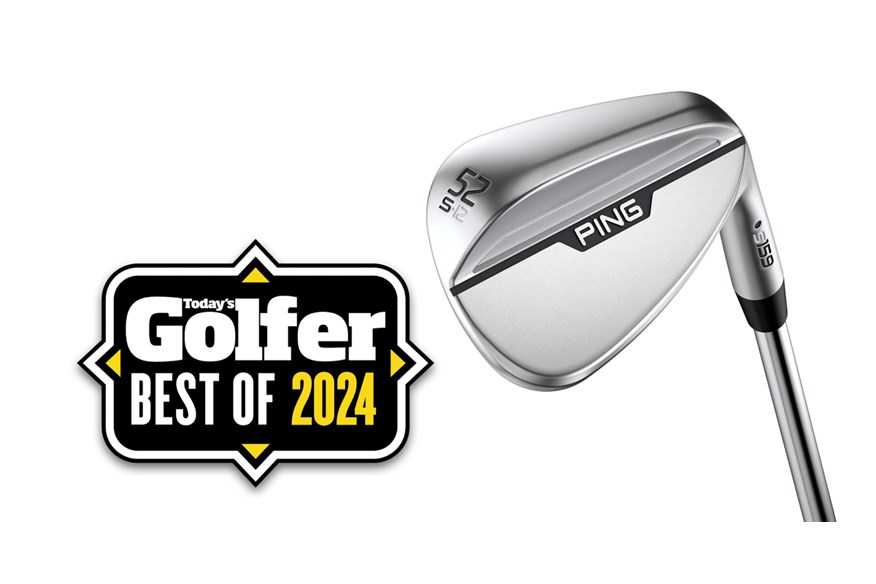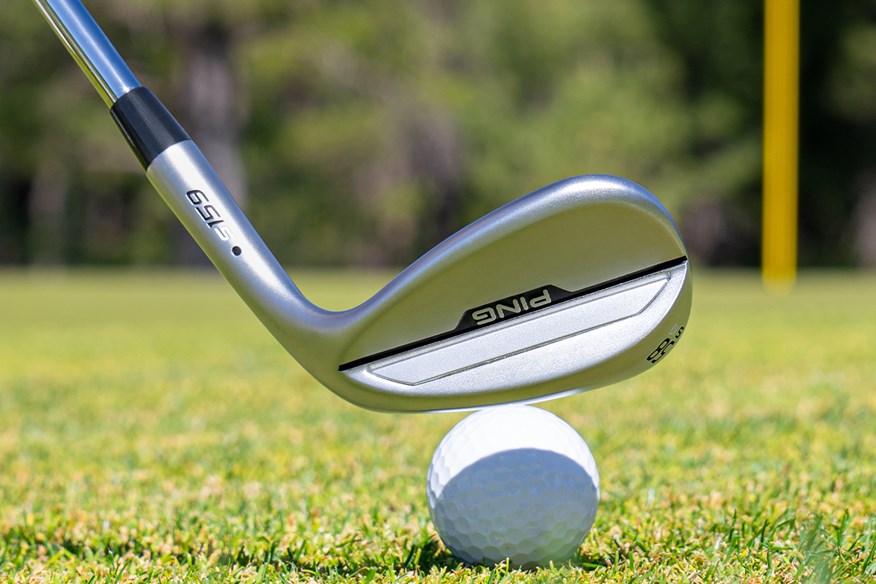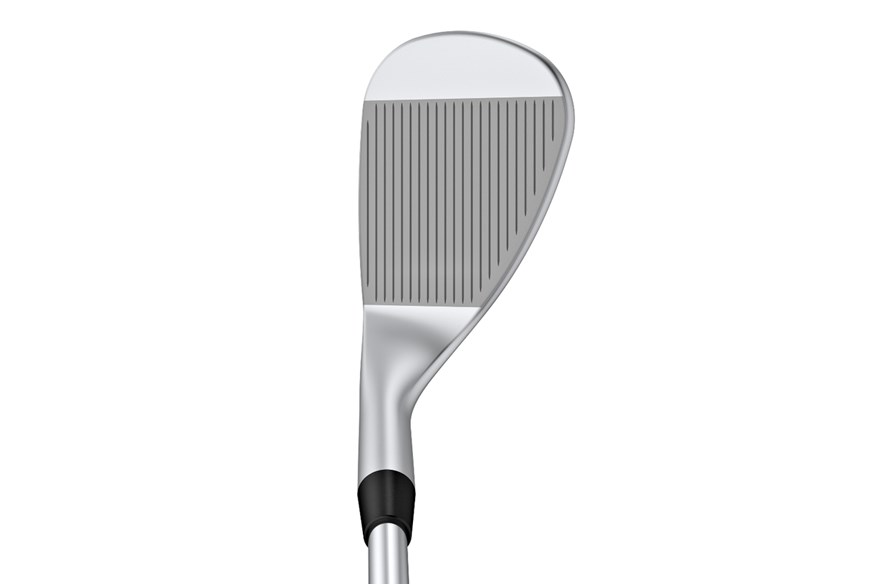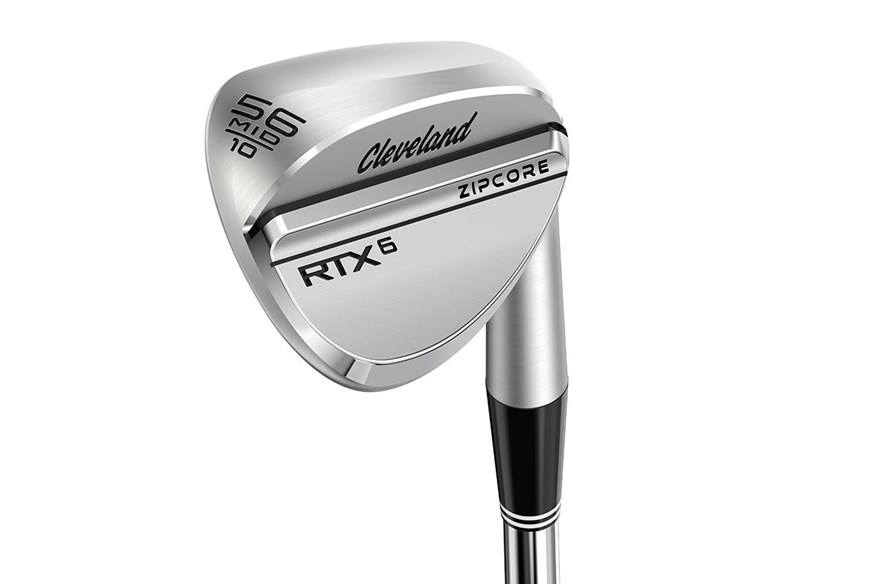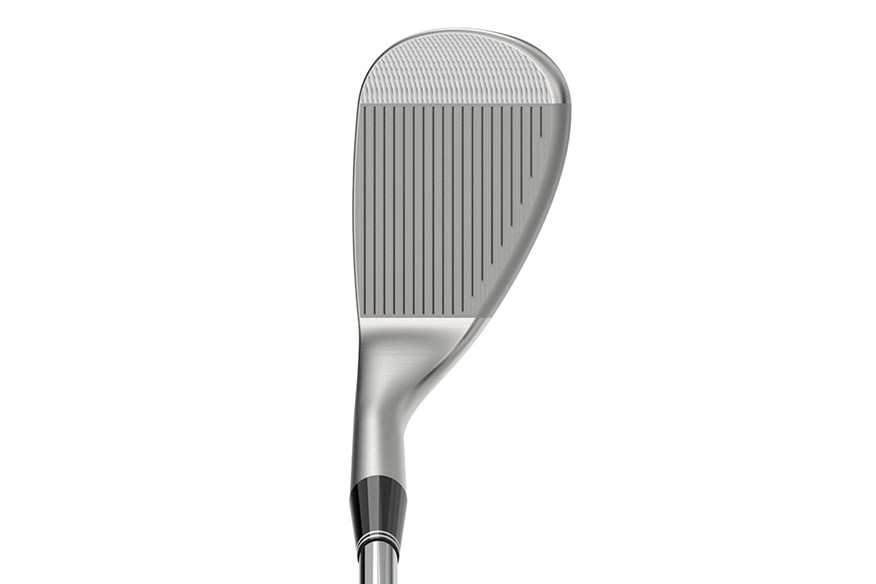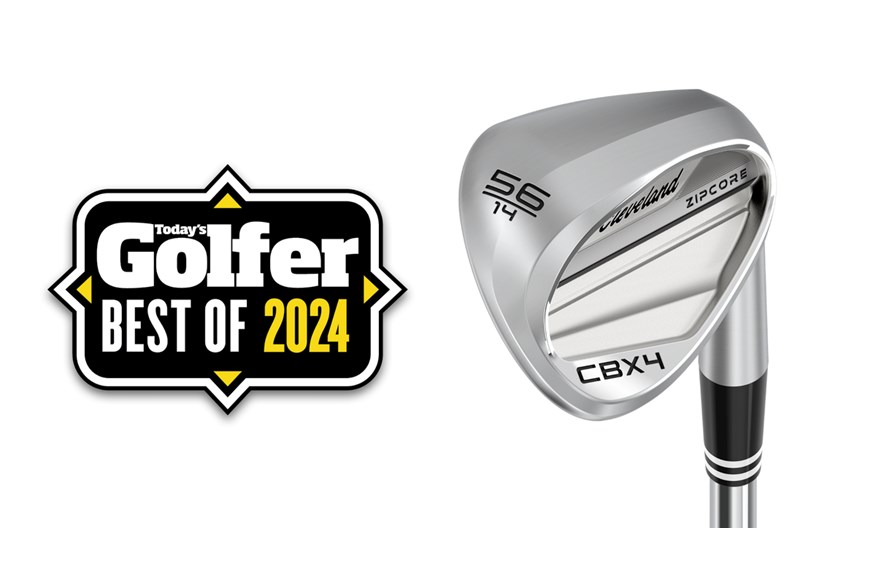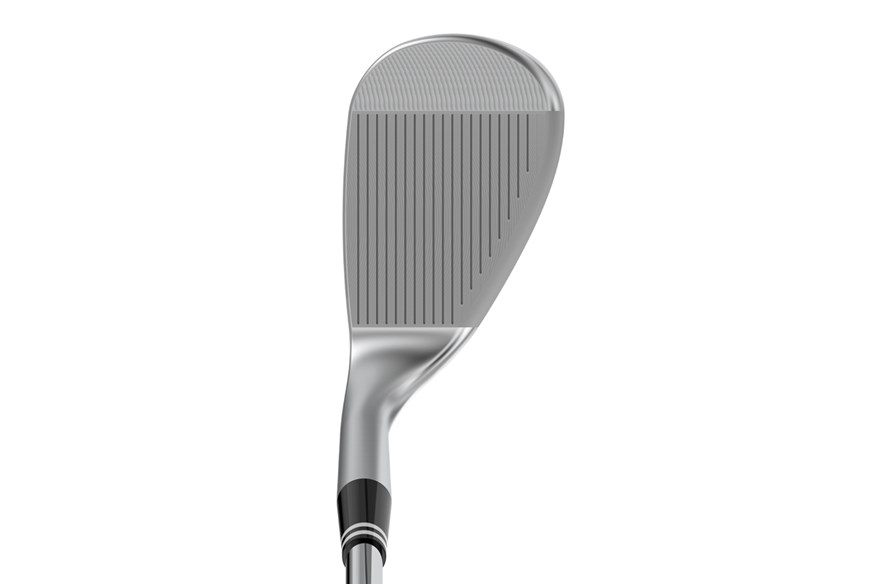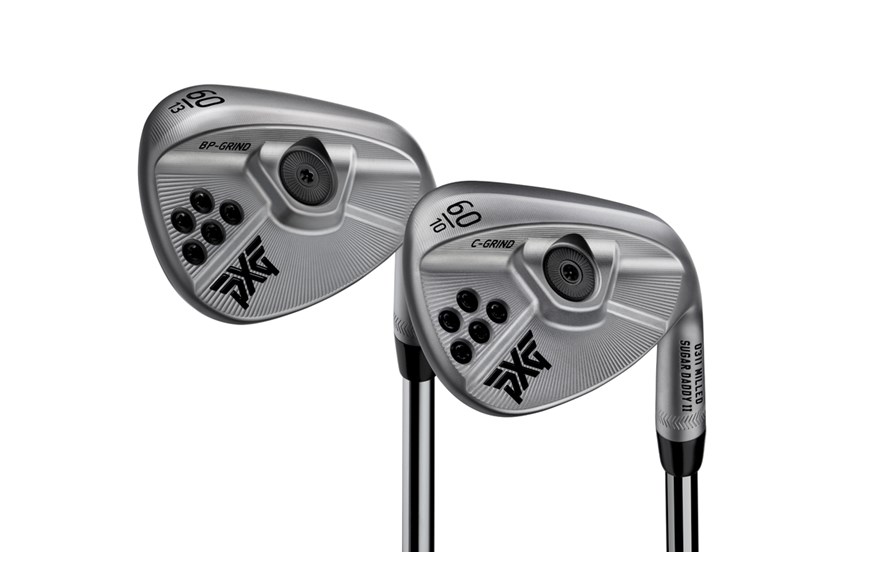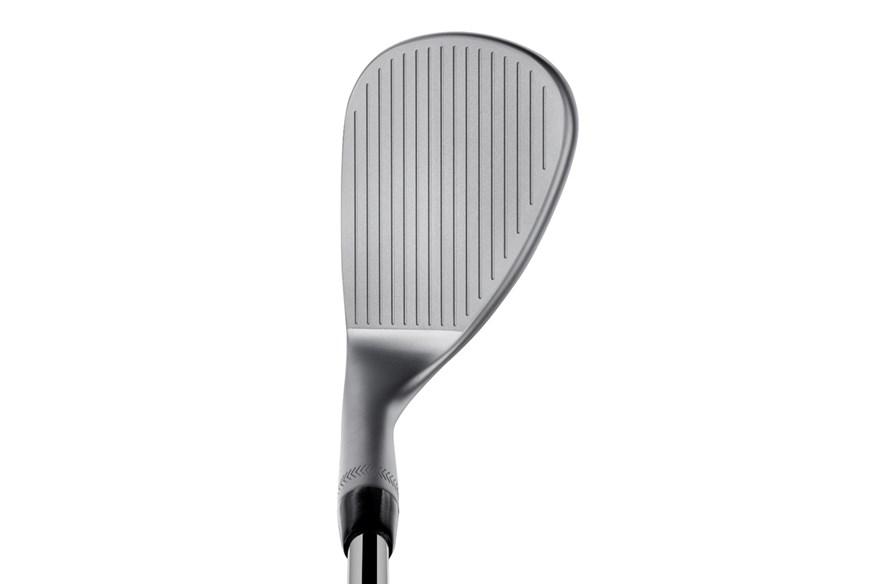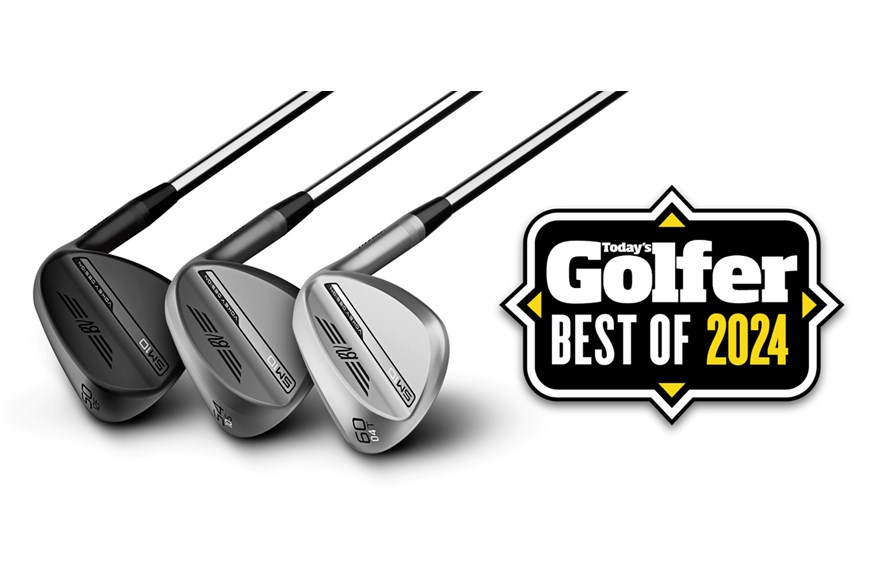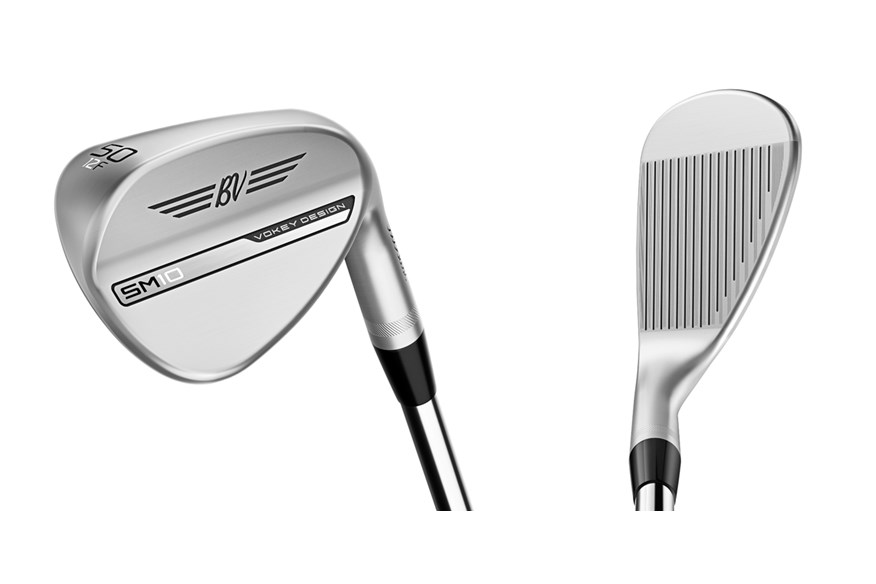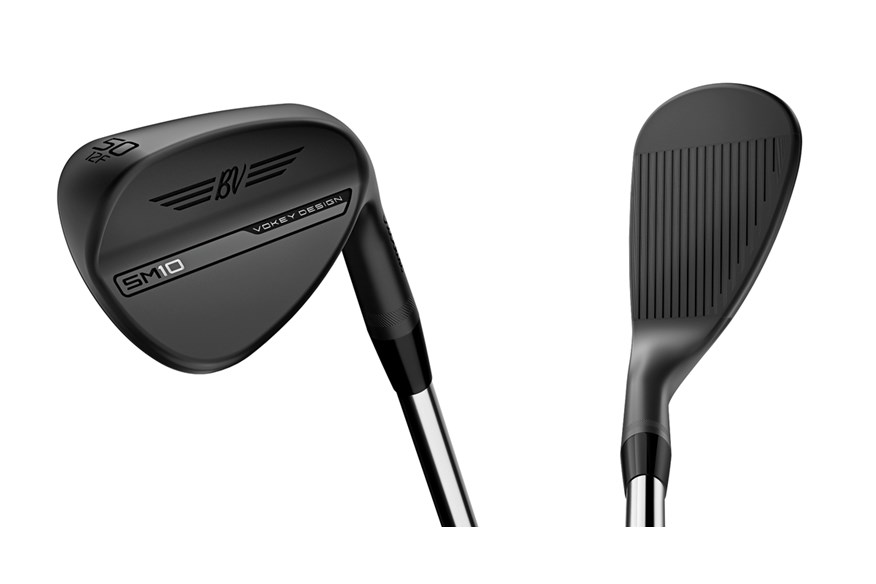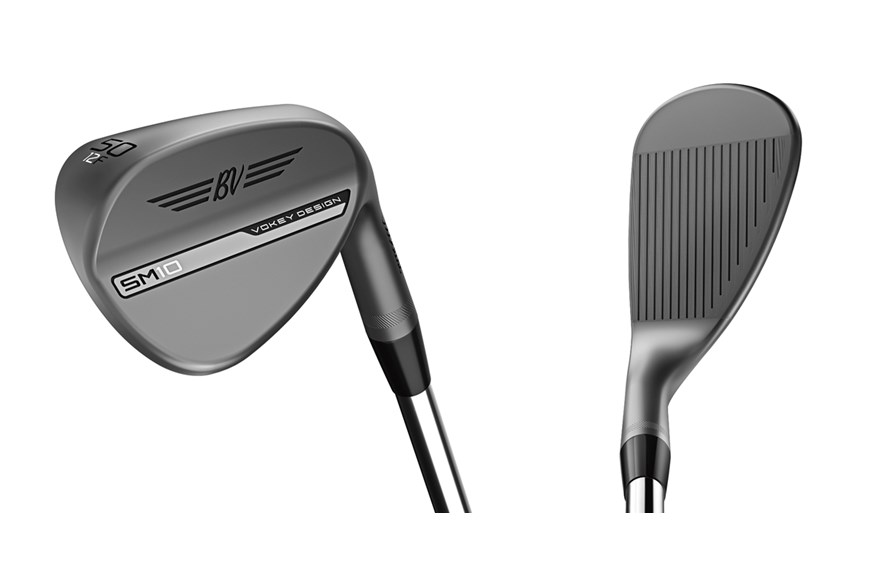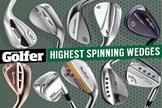Which 2025 wedge spins most? We rank wedges by backspin
Last updated:
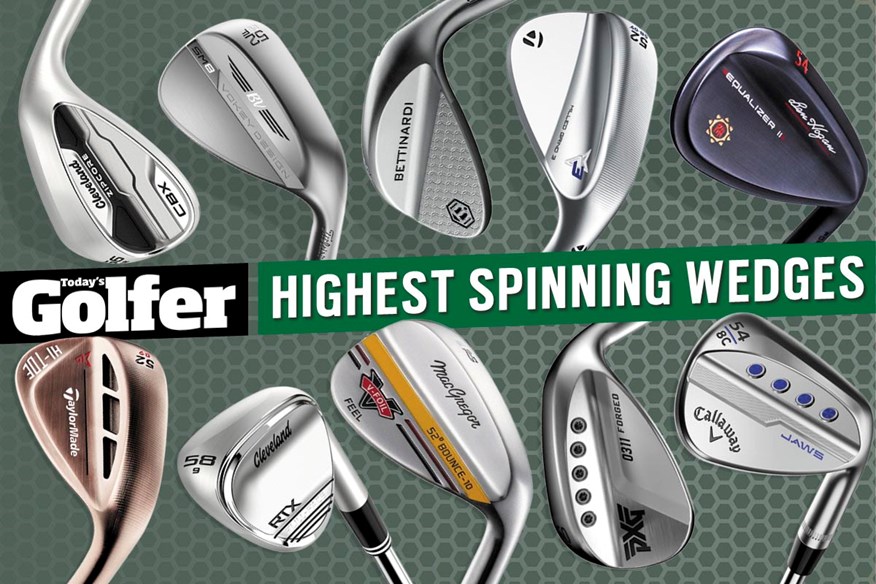
My in-depth 20-club, launch monitor-backed review identifies which 2025 wedges spin the most.
There’s a lot more to buying new wedges than just focusing on which produces the highest spin rate. Getting the correct lofts, bounce, sole grind, and finish is key, as is picking between blade and cavity backs, not to mention things like full-face grooves and high-toe shapes.
But wedge spin is still very important, and regularly comes high up the list of priorities when most club golfers are looking at buying new wedges. Spin is what makes your ball grab and grip when it hits the greens surface, helping you control those all-important short shots. And, as our test showed, there’s a substantial difference between the best wedges that produced the most spin and those creating the least.
In the hands of TG Test Pro Neil Wain our comprehensive test pits 20 of the leading 2025 wedges head-to-head on a launch monitor. Below my rundown highlights the highest spinning wedges of 2025 and what you should think about before simply plumping for the model that offers up the most stopping power.
2025 Wedges Ranked by Backspin – Jump to:
- Why you shouldn’t just buy the highest-spin wedge
- What is spin consistency?
- How do brands make wedges spin more?
- The highest spinning wedges in 2024
- Highest spin wedges data chart
- How we tested the wedges
Why you shouldn’t just buy the highest-spinning wedge
No brand ever sets out to make lower spinning wedges, in the way they do with the best low spin drivers, as backspin on approaches is stopping power and control, traits which allow golfers to fly golf balls a set distance and confidently stop the ball on a dime. Golfers only get good levels of consistency and predictability when backspin is imparted at similar rates no matter what the lie or impact location, so there’s little point in one shot spinning at ridiculously high levels if the very next shot from a similar distance spins very little, that just makes the game more difficult to play.
Based on my years of testing golf equipment be very wary if your eyes are drawn to the top of any ‘highest spin wedge’ list, as while it’s useful information to know what will help you score better more frequently is greater spin consistency.
What is spin consistency?
Consistency is the buzzword that’s crept into golf more so in the last few years than ever during the last three decades. Where talk used to be more focused on additional speed and more distance (and extra backspin when it came to wedges), consistency, and particularly spin consistency is a term batted around by all the major players much more often today.
The thinking behind ‘Spin Consistency’ boils down to if it’s possible to reduce the amount of spin difference between shots hit on and off-center (toe strikes are usually lower spin and heel strikes are usually higher) then it’s possible to narrow the amount of distance difference between good strikes and not so good hits. And when shots fly more predictable distances golfers get more consistent, more repeatable results which over time will shave shots from their game.
How do brands make wedges spin more?
Wedge manufacturers employ a number of methods to not only make their wedges spin more but also make them spin more consistently, here’s how the tricks of the trade work.
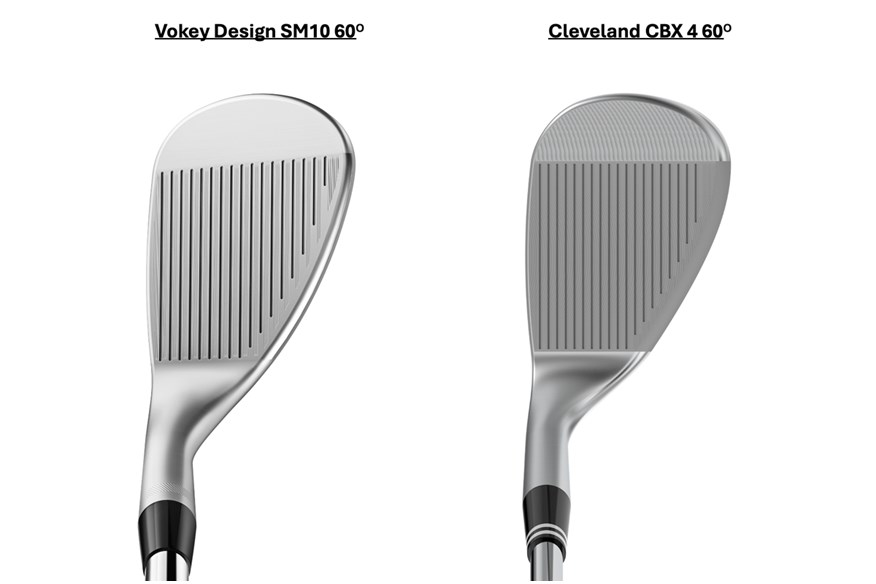
More grooves/different-shaped grooves
It’s a very modern thing to do but positioning wedge grooves closer together (how close they can go is governed by the rules of golf) means it’s possible to place more grooves on the face of a wedge. More grooves mean there are more edges to come into contact with the ball, and more edges equal more spin.
It’s common for brands to employ narrower grooves on their lower lofted wedges, as these are more commonly hit with full swings so need less help creating more spin. Whereas higher lofted wedges from the best brands will have wider grooves, as these are the clubs hit with slower and half swings for the most delicate approaches, and wider grooves allow more of the golf ball surface into each groove generating maximum spin at lesser speed.
Rougher faces
It’s no secret rougher wedge faces grab and grip the ball more than shiny polished surfaces. The faces of the new Callaway Opus have specifically been blasted with a coarser quartz material (rather than smaller sand particles) to create additional surface roughness. Models like the TaylorMade MG4 also have laser-etched Spin Tread grooves and faces that rust over time to maximize surface friction.
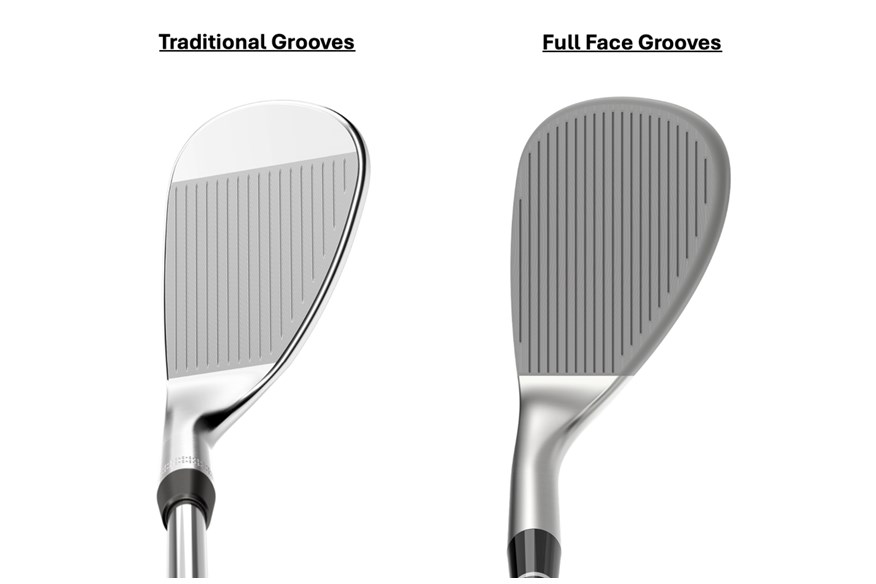
Hydrophobic finishes
Just like car tyres wedge faces can struggle to generate grip in wet conditions. Over the last five years it’s become common practice for brands to try and even out spin levels between wet and dry conditions to offer golfers greater on-course consistency and predictability.
Ping’s engineers pioneered the idea and created a hydrophobic finish that hates water, today the company’s S159 wedge dissipates moisture faster allowing the company to claim golfers see very little difference in spin and stopping power between wet and dry conditions.
Full face grooves
Every reputable wedge brand other than Titleist creates full-face groove versions of most of their wedges. Full-face groove wedges have grooves that run all the way to the perimeter of the head, not just in the intended impact area. The idea is usually employed on the best lob wedges as they’re the ones most used from sand and thick rough, situations where shots are less likely to impact center face, ensuring maximum spin is imparted no matter where shots are hit.
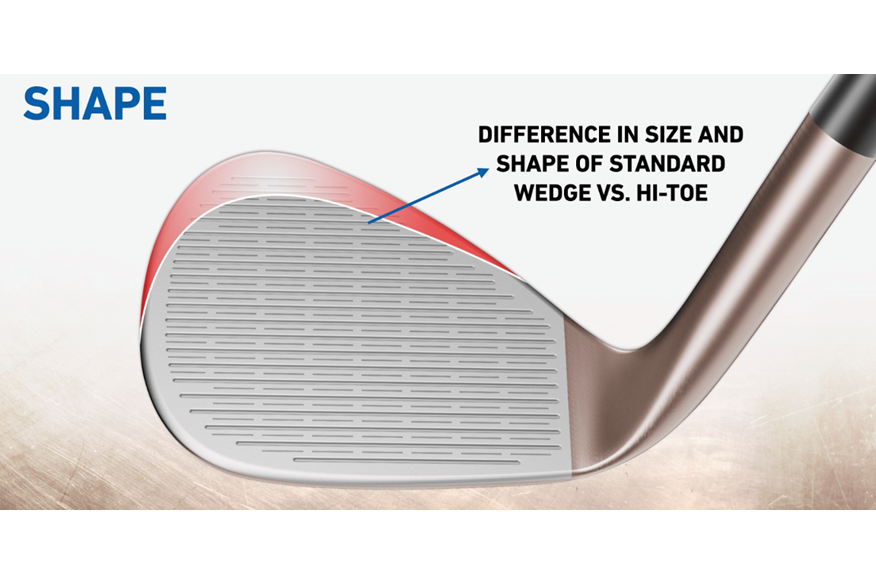
Hi-Toe shapes
TaylorMade’s Hi-Toe wedges can lay claim to igniting the Hi-Toe trend we know today but it was players like Phil Mickelson reverting to Ping Eye 2 wedges (that had a very round high toe shape) from the 80s because they spun more that gave engineers reason to investigate why.
The TaylorMade Hi-Toe 4 and other Full-Face models increase spin as thanks to the shape the center of gravity is higher up the face than a traditionally shaped wedge. The higher CG means the head reacts differently at impact so shots can be expected to launch lower and spin more. If you like the idea of lowering your wedge ball flight and upping wedge spin but like me are not a fan of Hi-Toe shapes, thanks to tungsten along the top edge the Callaway Opus Platinum offers up high-toe performance in a regular-shaped head.
Watch: Best 2024 Wedge video
The highest spinning wedges in 2025
Before we get too carried away you will need to put a premium on Japanese forging to warrant buying in, as a set of three will set you back a hefty £747. If you do, expect a very sharp-edged wedge with a slightly higher heel shape from what is an excellent tour-level model.
After hitting the 52° from short and longer range I believe the VWX will work best in the hands of reasonably confident short gamers, as the head is pretty compact and less forgiving than some of the competition. With a limited run of lofts make sure your game fits this model perfectly before splashing out.
Pros
- Incredible spin
- Slightly more rounded profile
- Nice simple design
Cons
- Limited options
- Not the most forgiving
2nd Highest Spin Wedge 2024 - 8402 RPM
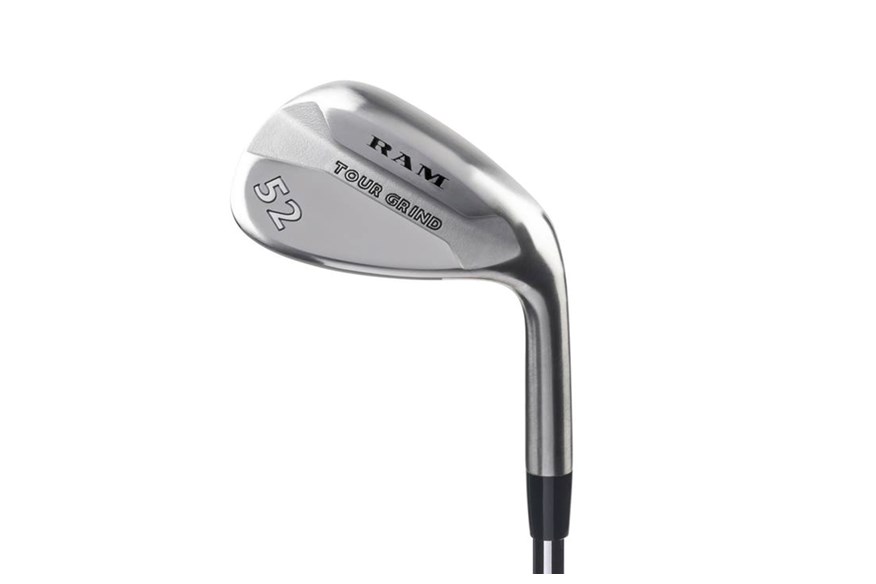

Even though neither myself nor our test pro were fans of the head shape (the leading edge is quite pronounced and rounded) it isn’t offensive, and shouldn’t be a reason to not buy if your budget is less than £150 for a set of three new wedges. At this price don’t expect a branded shaft or grip.
Pros
- The price is attractive
- Less fussy golfers won't be put off by the clunky head shape
- There are two finish choices
Cons
- There's a lack of top-quality components
If you’re the type of golfer who just wants a brilliant traditionally shaped wedge with a familiar groove pattern, and your game will benefit from a ton of loft, sole grind, and finish options the MG4’s will be right up your street. In my book, if you see the MG4 as a Titleist Vokey SM10 alternative you are thinking exactly along the right lines.
From what I’ve seen I can’t say the MG4 will ensure you’ll see no spin difference between wet and dry conditions, as my Wet Wedge Test highlighted how the model generated 30% less backspin in damp conditions. This however is often the case with many leading wedges.
Golfers who love very straight leading-edge wedges though will adore the MG4 lower lofts, they’re just about the straightest I’ve seen. Be prepared for them though to get progressively more rounded as lofts increase.
We all want to know we’re buying the right equipment when we splash the cash and if you’re looking for data to confirm your tour-level wedge choice the MG4’s definitely won’t let you down.
The model was one of only three wedges to create more than 8000 RPM backspin in the hands of our test pro. With 8003 RPM the MG4 created 4.4% more spin than our test average, which warranted a seriously impressive third-best performance among the 20 models (at 52° test loft) tested.
Throw in a smaller/tighter carry distance drop-off and shot area performance than our test averages and you can absolutely understand why the MG4 ranks among my four best performing wedges of 2025.
Read our full TaylorMade MG4 wedge review
Pros
- The MG4's are beautifully shaped
- Dropping less spin in wet conditions is a massive plus for shot predictability
- Expect additional feel over previous generations
Cons
- You will get a fraction more spin from the TaylorMade Hi-Toe 4 wedges
Our test data completely supports Mizuno’s thinking too. The model was our fourth-highest spinning wedge of 2024 which should at least highlight the S23 as a force to be reckoned with. It wasn’t finished there though. Throw in a tied first for smallest carry distance drop-off (6 yards - tied with the Mizuno T24 and More MOD 1) and the tightest shot area of all 20 (52° samples) wedges hit and you’ve got a seriously good performing model on your hands.
Before we all go bleary-eyed and gooey for the S23, I do need to point out that at £185 a pop this is one of the most expensive mainstream wedge families you can buy into in 2025. The product is also in its second year on the shelf, which says to me it’s a good option.
Read our full Mizuno S23 wedge review
Pros
- Slightly more forgiving cavity back performance
- The center-face CG serves up good feel and feedback
- A nicely shaped wedge family
Cons
- An expensive cavity back wedge option
I love that the heads have been designed in conjunction with Bernhard Langer and unlike most modern wedges it’s forged not cast. Interestingly Langer likes to see offset in his wedges (a feature Nick Faldo looked for in his pomp) as he feels it helps encourage hitting down on the ball and promotes keeping the hands ahead of the leading edge, which he believes helps improve consistency.
Irrespective of why the Wingman is designed this way there is zero doubt in mind this model represents excellent value for money. To my eye, the constant offset heads, which position the leading edge slightly further back and more in line with the hosel give the impression it’s easy to hit down onto the ball and slip the head under the ball for shorter more delicate approaches. I also loved the impact feel, sound, and feedback too.
At 7982 RPM our test data has the Wingman down as our fifth-highest spinning wedge in 2024, the backspin drop-off was also smaller than our test average. So, golfers should expect good shot-to-shot spin consistency out on the golf course.
Before you get too carried and order online make sure you take a look at the heads in the real world. The offset does give a slightly different appearance at address, but to me, it’s not distracting at all, which means the Wingman is a steal at $139/£139 in 2025.
Read our full Tour Edge Wingman wedge review
Pros
- These are very keenly priced, but tech-laden forged wedges
- There's plenty of fitting opportunity to ensure you get the perfect wedge setup for your game
- I really like the leading-edge shape
Cons
- You will need to like or accept the offset look
Throughout their life span, and there were more than four generations, the previous Glide family never quite hit the spot with us here at TG. Even though the company talked up their brilliant Hydrophobic finish tech, which neutralized the effects of damp conditions reducing spin, their blade lengths tended to be a little long and often to my eye looked a little clunky. That’s all changed with the brilliant new S159 in 2024.
If your game can justify buying into tour-level wedges the S159s are one of the best-shaped and most desirable wedges I’ve seen this year. Our test numbers are pretty impressive too. With a backspin rating 300 RPM above our test average, the S159 can get approaches zipping across the dancefloor. The model also posted the lowest backspin drop-off of all 20 (52° lofts) wedges hit which means you can expect good shot-to-shot spin consistency and predictability too, which of course will ultimately lead to lower scores.
Make sure you take Ping up on the opportunity to get properly fitted as there’s a good selection of sole grinds, lofts, and shaft options to dial into your perfect set-up.
Read our full Ping S159 wedge review
Pros
- Very consistent spin numbers
- Sleek looks
- Nice feel
Cons
- Less forgiving than some wedges
Our test data has the ZipCore hovering at 300 RPM above average levels of backspin in 2024, but with so many factors to consider when buying new wedges, it’s worth remembering you should never just pick the highest spinning model. What’s much more important, is having a full range of lofts, bounce or sole grind options, and the ability to choose a finish that suits your eye, as you have to love your wedges if you’re ever going to get the best out of them on the golf course. And options are where Cleveland utterly excel.
From 100 yards out our test pro’s shots had a 9-yard drop-off (from longest to shortest) and 4.9-yard left to right dispersion, which gave a shot area 37% tighter dispersion than our test average. In anybody’s book that’s cracking accuracy performance. If you’re happy looking at full-face grooves there’s also a new RTX 6 Full-face model this year, where this standard model now heads into its second year of product cycle.
Read our full Cleveland RTX 6 ZipCore wedge review
Pros
- Great range of options
- A brilliant profile
- Supremely accurate
Cons
- They will be out of date at the end of 2024
8th Highest Spin Wedge 2024 - 7820 RPM
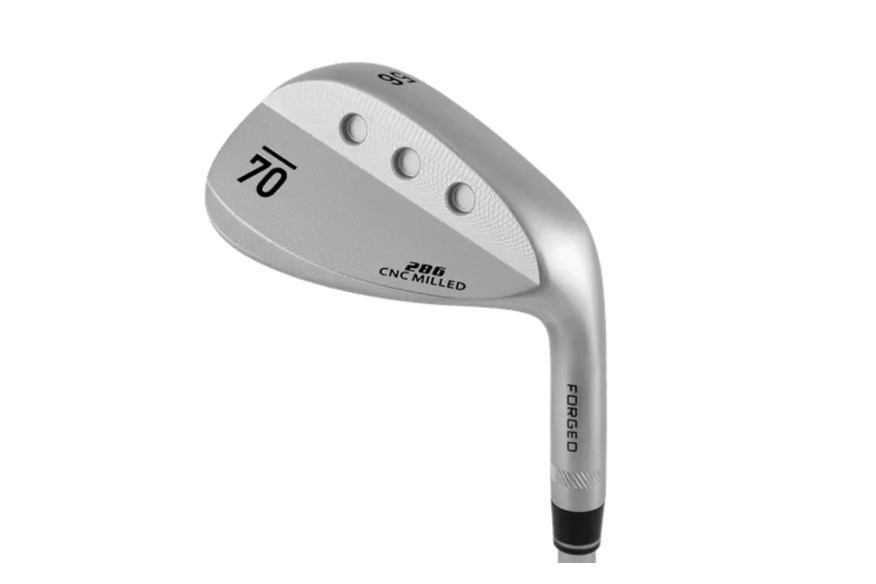

We’ve tested Sub 70s best forged irons and wedges over several years here at TG and they’ve always performed pretty well. The 286 isn’t the company's latest wedge but it's forged unlike many modern offerings, and we like the straighter leading-edge shape, the feel, and feedback.
If I were spending my own money on new wedges I’d be attracted to the 286 as it’s available in a great range of lofts (46 – 64), three finishes, and through the brand's website, you can tailor the shaft, grip and ferrule to your own desire. A cracking high-spin wedge option for very sensible money.
Pros
- The head is forged
- The shape and profile are good
- Each head can be customized to your preference
Cons
- You will need to buy without seeing or hitting them
The CBX 4 was brand new for 2024 and my thinking absolutely hasn’t changed from its predecessor. We don’t suddenly become tour pros’ when pulling a wedge from the bag. So, if you’re looking for maximum wedge efficiency, forgiveness, and consistency you simply have to ask yourself if you can accept cavity back wedges in 2025. If you can the CBX4 is the best money can buy.
As far as test data goes the CBX 4 is a top performer for many reasons. Yes, the model’s beautifully CNC-milled and laser-etched face produced 1.7% more backspin than our test average but much more importantly that spin was consistent. The drop-off between our test pro’s highest and lowest spinning shots was 949 RPM, that is 45.4% tighter than our test average and 3rd best across the entire 20 different 52° wedges we hit this year. Throw in a carry distance drop-off of 9 yards (that’s the longest to shortest shots) from 100 yards out and a shot area smaller than our test average and you soon realize this is a top-performing wedge for numbers.
The CBX’s beauty doesn’t just lie in numbers though. This is a seriously good-looking and feeling wedge, it’s beautifully finished and now in its fourth generation, it also feels like the model has blossomed and come of age too. My thinking is many golfers at address won’t be able to spot the differences between its slightly larger head and the tour-level Cleveland RTX 6.
The icing on the cake apart from the slightly lower price, is the ton of loft choices, but also the lack of sole grind or bounce options as Cleveland just make this model in the specs best suited to its target audience. A move that takes a ton of hassle and confusion out of buying new wedges.
Read our full Cleveland CBX 4 wedge review
Pros
- Extremely forgiving
- Brilliant for club golfers who use cavity back irons
- Sole grind and bounce choices are simplified by loft
Cons
- Head may be a little large for some
10th Highest Spin Wedge 2024 - 7797 RPM
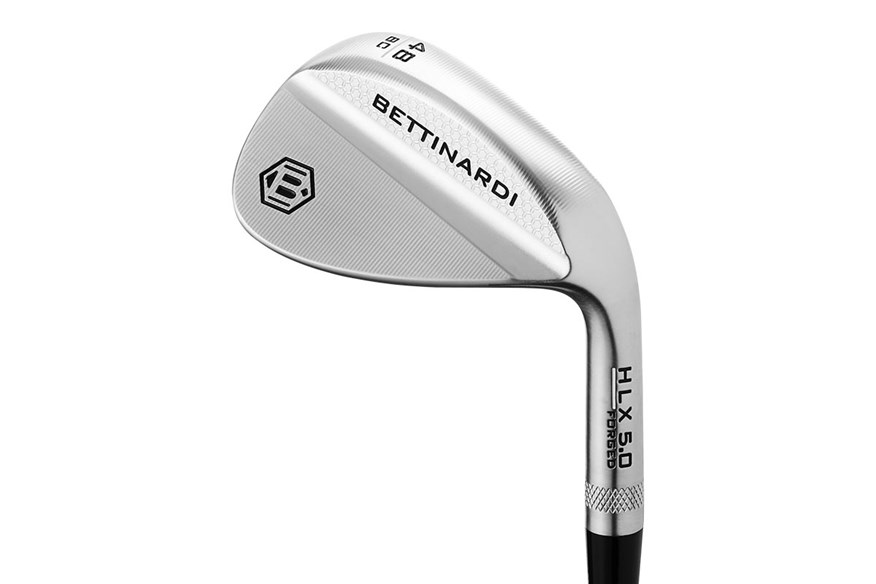

The HLX 5.0 are lovingly made wedges, with focus poured onto every tiny detail, but I should highlight their profile has a much more rounded and curved aesthetic than many modern wedges. As lovely as they are my only issue is the price.
In a world where there are plenty of lovely tour-endorsed wedges out there for less cash, realistically it’s only likely that hardcore Bettinardi fans will buy in. If you do you won’t be disappointed as our test data highlights the model as being among the top 10 wedges for spin this year. As you'd expect from the milling genius that is Bettinardi you get plenty of lovely, machined details you don’t get from more mass-produced models.
Pros
- These are beautifully made wedges
- Unlike many modern wedges, the HLX 5.0 are forged
Cons
- You might struggle to find them at a retailer near you
- They're expensive
PXG might still be a young company, but their wedge-shaping from day one has always been second to none. I love the straight leading edge and how the club sits at address, the classy satin finish is also as simple as they come.
You will need to accept full-face grooves across all lofts on this generation, which for some will be unpalatable, but that’s how PXG has set the family up. So long as you can the 0311 was our 11th highest spinning wedge (7741 RPM), and hit shots into an area 37.1% tighter than our best 2024 wedge test average.
But the real sell that’s head and shoulders above the competition for making such a sizeable investment, is the ability to go lighter, heavier, longer, or shorter all without changing the center of gravity location, which right now no other brand can compete with.
Pros
- 100% CNC Milled like a premium putter
- You won't find a better shaped wedges
- Go longer, shorter, heavier or lighter without changing the CG location
Cons
- For this generation you will need to accept full-face grooves
It's really hard to say the SM10 is massively better than the previous SM9, I don’t believe they are but if I were spending my own money on new tour-level wedges in 2024 I would absolutely have the SM10’s on my radar. I love the head shapes, they’re so simple and unfussy, with the leading edges being quite straight in the lower lofts and slightly more sculpted in the higher lofts which gives the impression of playability and versatility right where you need it most.
I also like the idea that Titleist are comfortable and content with just making really good wedges. Unlike most of the competition, the SM10s don’t come with fancy full-face grooves, modern high-toe shaping, or the promise of a lightweight heel pad removing inefficient mass. In a world where almost every other brand is trying to sell you tech-laden wedges, Vokey are happy just doing what they’ve done for years, which is making a really good standard of wedge with mass market appeal.
Our test data doesn’t highlight the SM10’s as outstanding spreadsheet performers, in fact, a lot of the numbers we created were right on or hovering around our test averages. But I wouldn’t let that get in the way of me buying into Vokey wedges, as in my eyes the SM10’s are some of the best feeling, most desirable, and versatile wedges out there. If you’re spending this sort on money make sure you go and get fitted, and utilize the new Titleist wedge app to determine your ultimate set-up. If you’re looking for a finish recommendation the new matte Nickel is out of this world good.
Read our full Titleist Vokey SM10 wedge review
Pros
- The range of options is second to none
- Your short game benefits from the input of some of the best wedge players in the game.
- The feel and feedback are superb
Cons
- If you're buying a set the costs soon rack up
Data comparison: How 20 leading 2024 wedges compare for backspin
| Model | Loft | Ball Speed | Launch Angle | Backspin | Backspin Drop Off | Height | Descent Angle | Carry Distance | Carry Distance Drop Off | Shot Area |
| Vega VWX | 52° | 78.8 MPH | 24.6° | 8974 RPM (1) | 1212 RPM | 18 YDS | 43.4° | 94 YDS | 11 YDS | 62.7 SQ YDS |
| Ram Tour Grind | 52° | 78.4 MPH | 24.2° | 8402 RPM (2) | 1746 RPM | 17 YDS | 42.3° | 94 YDS | 15 YDS | 64.5 SQ YDS |
| TaylorMade MG4 | 52° | 78.3 MPH | 25.8° | 8003 RPM (3) | 1092 RPM | 19 YDS | 43.9° | 94 YDS | 8 YDS | 60.8 SQ YDS |
| Mizuno S23 | 52° | 81 MPH | 26.1° | 7987 RPM | 1289 RPM | 20 YDS | 45.2° | 99 YDS | 6 YDS (T1) | 23.4 SQ YDS (1) |
| Tour Edge Wingman | 52° | 80.5 MPH | 25.1° | 7982 RPM | 1382 RPM | 19 YDS | 43.9° | 98 YDS | 12 YDS | 100.8 SQ YDS |
| Ping S159 | 52° | 77.5 MPH | 24.9° | 7974 RPM | 791 (1) | 18 YDS | 42.5° | 93 YDS | 12 YDS | 68.4 SQ YDS |
| Cleveland RTX 6 | 52° | 77.4 MPH | 26° | 7911 RPM | 1791 RPM | 18 YDS | 43.7° | 93 YDS | 9 YDS | 44.1 SQ YDS |
| Sub 70 286 Forged Raw | 52° | 77.9 MPH | 25.5° | 7820 RPM | 2339 RPM | 18 YDS | 43.3° | 94 YDS | 7 YDS | 58.8 SQ YDS |
| Cleveland CBX 4 | 52° | 78.4 MPH | 26.5° | 7800 RPM | 949 RPM (3) | 19 YDS | 44.6° | 95 YDS | 9 YDS | 53.1 SQ YDS |
| Bettinardi HLX 5.0 | 52° | 78.5 MPH | 24.3° | 7797 RPM | 2109 RPM | 17 YDS | 42.1° | 95 YDS | 10 YDS | 45 SQ YDS |
| PXG 0311 Sugar Daddy II | 52° | 79.2 MPH | 25.7° | 7741 RPM | 2240 RPM | 19 YDS | 44° | 96 YDS | 10 YDS | 44 SQ YDS |
| Titleist Vokey Design SM10 | 52° | 78.2 MPH | 26° | 7653 RPM | 1926 RPM | 19 YDS | 43.9° | 95 YDS | 15 YDS | 139.5 SQ YDS |
| Vega Alcor | 52° | 79.9 MPH | 25.7° | 7633 RPM | 2006 RPM | 19 YDS | 44.1° | 97 YDS | 9 YDS | 64.8 SQ YDS |
| More MOD 1 | 52° | 79.2 MPH | 25.4° | 7512 RPM | 894 RPM (2) | 19 YDS | 43.4° | 96 YDS | 6 YDS (T1) | 28.8 SQ YDS (2) |
| Callaway Jaws Raw | 52° | 78.9 MPH | 26.3° | 7408 RPM | 2805 RPM | 19 YDS | 44.3° | 96 YDS | 7 YDS | 30.1 SQ YDS (3) |
| Ping Glide Forged Pro | 52° | 78.8 MPH | 26.2° | 7165 RPM | 2246 RPM | 19 YDS | 44° | 96 YDS | 11 YDS | 119.9 SQ YDS |
| Mizuno T24 | 52° | 76.3 MPH | 26.2° | 7059 RPM | 2131 RPM | 18 YDS | 43.1° | 92 YDS | 6 YDS (T1) | 44.4 SQ YDS |
| Wilson Staff Model ZM | 52° | 77.8 MPH | 26.4° | 7003 RPM | 1963 RPM | 19 YDS | 43.8° | 95 YDS | 13 YDS | 81.9 SQ YDS |
| Callaway CB | 52° | 78.9 MPH | 26.1° | 6856 RPM | 1672 RPM | 19 YDS | 43.7° | 96 YDS | 11 YDS | 90.2 SQ YDS |
| Inesis 900 | 52° | 78.8 MPH | 27.6° | 6685 RPM | 2168 RPM | 20 YDS | 45.2° | 97 YDS | 16 YDS | 172.8 SQ YDS |
| Average | 78.6 MPH | 25.7° | 7668 RPM | 1738 RPM | 18.7 YDS | 43.7° | 95.3 YDS | 10.2 YDS | 69.9 SQ YDS |
How we tested the wedges
We asked the leading brands to send us their wedges in our test Pro Neil Wain’s specs.
We created an indoor test lab at Keele Golf Centre to ensure a controlled environment, which meant we could use premium Titleist Pro V1x golf balls and a Foresight GC Quad launch monitor to create the most reliable data possible. We rejected major misses but recorded how shots launched, span, peaked out, and how far they flew in which direction.
See more about how TG tests golf clubs and other equipment.
